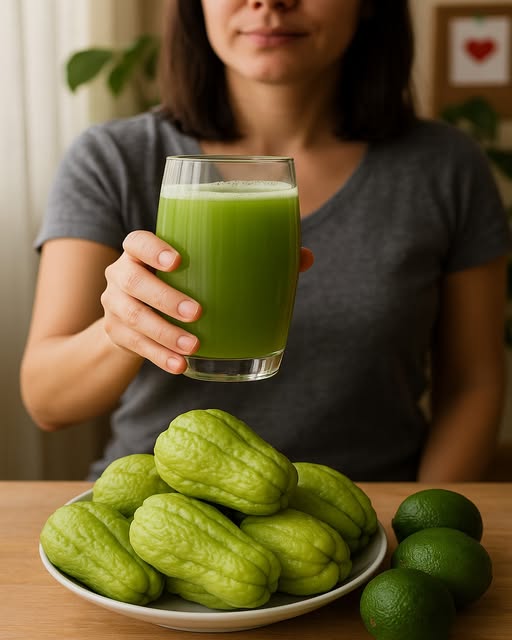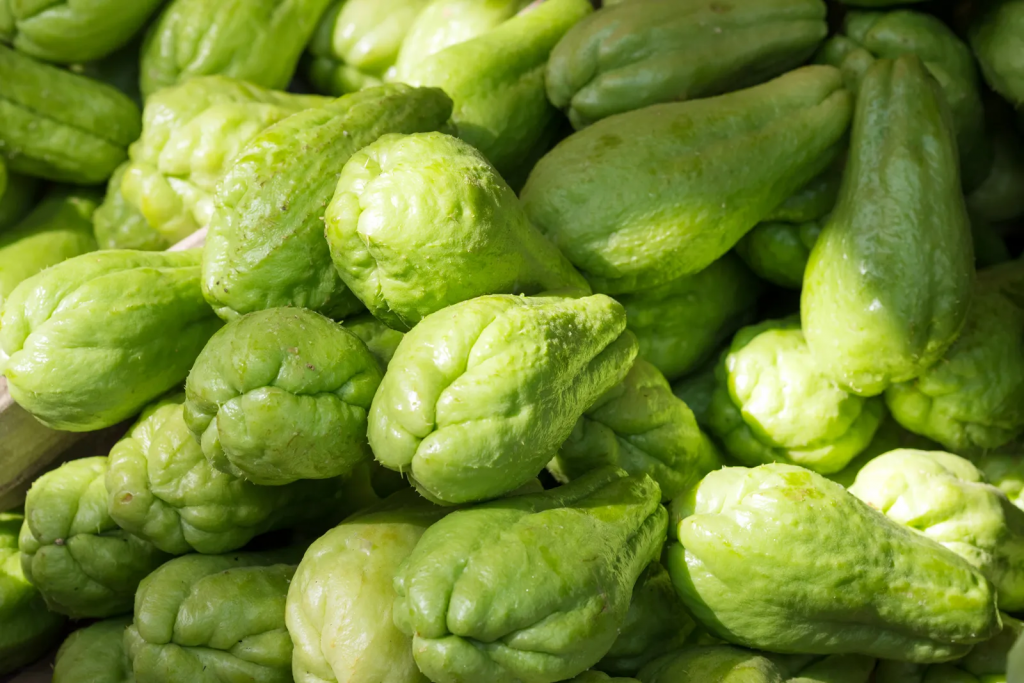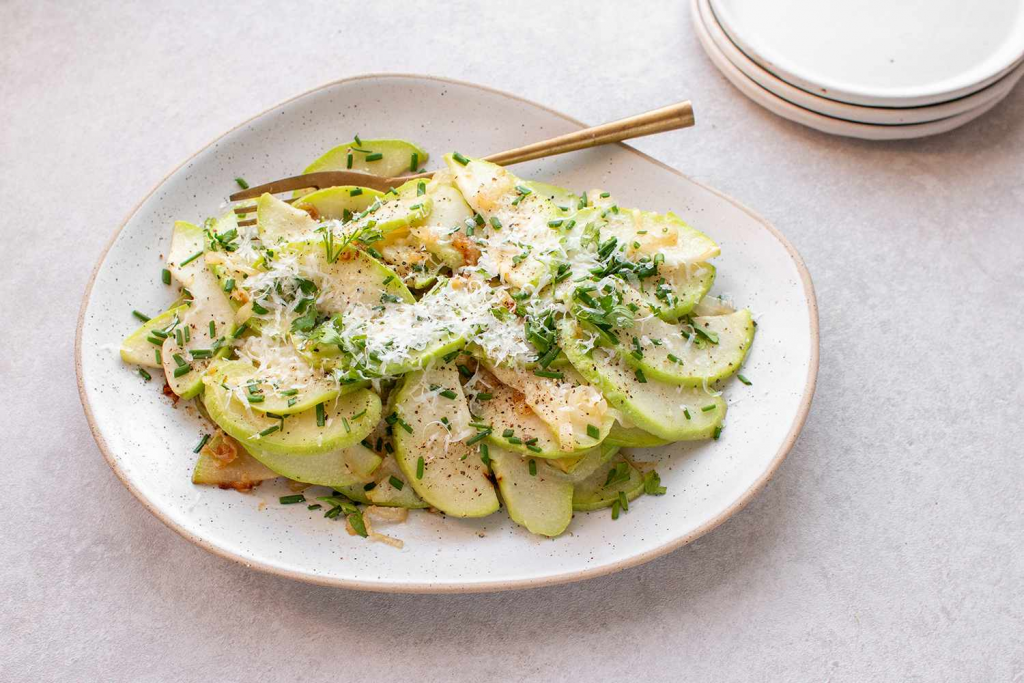Did you know that more than 50% of adults over 45 experience knee pain, swollen feet, or circulation problems at some point in their lives? Add to that the growing number of people diagnosed with high blood pressure and high cholesterol, and it’s no wonder pharmacies are filled with pills promising quick relief. But what if nature already had a solution waiting in your kitchen or garden?
Chayote, a humble green vegetable often overlooked in grocery stores, is emerging as a powerhouse for natural wellness. Known by different names around the world—such as “mirliton” in Louisiana or “sayote” in the Philippines—this pear-shaped squash is packed with nutrients that support heart health, circulation, bone strength, and more. Generations before us used it not only as food but also as a home remedy for common health issues.
In this article, we’ll explore how chayote may help reduce knee pain, improve poor circulation, lower cholesterol, support blood pressure, and even fight anemia. You’ll also learn how to prepare it, integrate it into your daily meals, and discover why so many people are returning to this natural remedy instead of reaching for pills.

What Makes Chayote So Special?
Nutritional Profile
Chayote is low in calories but rich in vitamins, minerals, and antioxidants. Its unique nutrient balance makes it especially effective for conditions related to inflammation, circulation, and overall energy.
Key Nutrients in Chayote (per 100 grams):
- Calories: 19
- Vitamin C: 17% of daily value
- Folate: 23% of daily value
- Fiber: 2 grams
- Potassium: 125 mg
- Magnesium, manganese, zinc: trace but essential amounts
This combination supports bone health, boosts circulation, and nourishes the body without adding excess calories.

Traditional Uses
Historically, chayote has been used in natural medicine to:
- Reduce swelling in feet and joints
- Support digestion and kidney function
- Improve circulation and heart health
- Provide energy for recovery from anemia
Health Benefits of Chayote
Relief for Knee Pain and Swollen Feet
Joint pain and swelling are often linked to inflammation and fluid retention. Chayote is naturally rich in water and potassium, helping the body eliminate excess sodium and fluids. By balancing electrolytes, it may reduce swelling in feet and ease pressure in the joints.
Practical Tip: Try steaming chayote and adding olive oil and lemon. Eating it regularly provides hydration and minerals that support joint function.
Supporting Healthy Blood Pressure
High blood pressure affects more than 1 billion people worldwide. Chayote is low in sodium and high in potassium, making it ideal for balancing blood pressure naturally. Potassium relaxes blood vessel walls, improving circulation and reducing strain on the heart.

Case Example: In several Latin American households, chayote tea made from its leaves and fruit is a traditional remedy for hypertension. While not a replacement for medical care, many families swear by it as part of their diet.
Lowering Cholesterol Naturally
The soluble fiber in chayote binds with cholesterol in the digestive tract, reducing its absorption. Over time, this may help lower “bad” LDL cholesterol while supporting “good” HDL cholesterol.
Recipe Idea: Add chayote cubes to chicken or vegetable soup. The fiber blends in seamlessly, making it an easy heart-friendly addition to meals.
Improving Poor Circulation
Poor circulation can lead to fatigue, cold hands and feet, and even varicose veins. Chayote contains flavonoids and antioxidants that strengthen blood vessels, reduce oxidative stress, and improve circulation efficiency.
Daily Habit: Drinking boiled chayote water (strained and cooled) is a traditional practice to support circulation and hydration.
Combating Anemia
Chayote is a good source of folate, an essential B vitamin that supports red blood cell production. Combined with iron-rich foods, chayote enhances nutrient absorption and energy levels.
Tip: Pair chayote with lentils or spinach to create an anemia-fighting meal rich in both iron and folate.

Practical Ways to Use Chayote
Cooking Methods
- Boiled or Steamed: Retains most nutrients; perfect for salads or side dishes.
- Sautéed: Combine with garlic and onions for a flavorful, nutrient-dense stir-fry.
- Soups and Stews: Adds bulk and nutrients without excess calories.
- Juice or Tea: Blend with cucumber and lemon for a refreshing detox drink. Boil leaves for a mild tea to support circulation.
Storage Tips
- Keep fresh chayote in the refrigerator for up to 3 weeks.
- Store cut pieces in airtight containers to prevent drying.

Real-Life Experiences
- Maria, 63, from Mexico: Maria began eating boiled chayote three times a week to help with swollen ankles. Within a month, she noticed less fluid retention and easier movement.
- James, 50, from Texas: Diagnosed with high blood pressure, James replaced part of his starchy side dishes with steamed chayote. Along with lifestyle changes, his blood pressure readings improved.
- Linda, 45, from the Philippines: Linda suffered from frequent fatigue linked to anemia. She added chayote to her soups with chicken liver. Over time, she felt more energetic and alert.
Quick Reference Table: Benefits of Chayote
| Health Issue | How Chayote Helps | Best Way to Use |
|---|---|---|
| Knee Pain & Swollen Feet | Reduces fluid retention, hydrates | Steamed or in soups |
| High Blood Pressure | High potassium, low sodium | Tea or boiled dishes |
| High Cholesterol | Soluble fiber lowers LDL | Soups and salads |
| Poor Circulation | Flavonoids support blood vessels | Chayote water or tea |
| Anemia | Folate supports red blood cells | Paired with iron-rich foods |
Conclusion
Frequently Asked Questions
Can chayote replace my medication?
No, chayote is a supportive food, not a replacement for prescribed medication.
How often should I eat chayote to see results?
Regular consumption, at least 2–3 times per week, may help support long-term wellness.
Is chayote safe for everyone?
Yes, it is generally safe. However, if you have chronic conditions or take medication, consult your doctor.
Can I drink chayote tea daily?
Yes, many people do. But moderation is key, and medical guidance is recommended.
Chayote is more than just a vegetable—it’s a natural ally for knee pain, swelling, circulation, blood pressure, cholesterol, and anemia. By adding this affordable and versatile food to your diet, you can take simple steps toward a healthier lifestyle without relying solely on pills.
Disclaimer: This article is for informational purposes only and does not replace professional medical advice. Always consult a qualified healthcare provider before making changes to your health regimen.




